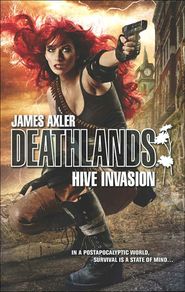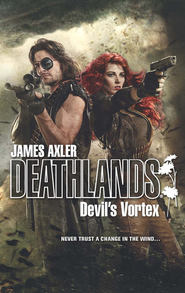По всем вопросам обращайтесь на: info@litportal.ru
(©) 2003-2024.
✖
Sunspot
Автор
Год написания книги
2019
Настройки чтения
Размер шрифта
Высота строк
Поля
The albino was already doing just that. Because the crumbling bank on the right would never have held the companions’ weight, he led them in the opposite direction, to the crest of a teardrop-shaped, scrub-covered island, high ground where they could make a stand.
As Ryan high-stepped through the boot-sucking muck of the island’s beach, he heard a growing rumble like an earthquake and half turned. Surging up behind the dogs and horses was a foaming wall of milky-brown water ten feet high.
“Hang on to something!” Krysty cried out to him.
As Ryan grabbed hold of the branches of a low bush, the flash flood slammed into the mounted pursuit. The force of the wave and its load of debris bowled over the horses and riders. It swept away the dogs in an instant. For a split second Ryan glimpsed the head of a horse as it bobbed up, rushing past, its eyes wild with fear, then it disappeared under the churning surface.
The one-eyed man used the scrub limbs to pull himself to higher ground where his companions stood braced, their legs sinking deep into the soggy soil, their miserable, streaming faces lit by lightning. Ryan jammed his boots against the roots of the brush to help hold his position.
“What happened to the pursuit?” Krysty asked.
“Long gone,” Ryan told her.
“The water level is still rising,” Doc said. “It appears we’ve departed the frying pan only to land squarely in the fire.”
There was no doubt about that. Their little mound of safety was growing smaller and smaller by the minute; the river flowed around their knees. Ryan could feel the ground eroding from underfoot.
“What are we going to do?” Mildred said.
Krysty looked across the mocha-colored river. “Too strong a current to swim through,” she said. “We’d never make it to the bank.”
“Only thing we can do is wait it out,” Ryan said. “Hang on and hope we don’t get washed loose before the river starts to fall.”
After a while the torrential rain stopped, but the river continued to come up; soon it even submerged most of the brush on the island’s crest. Clustered together, the companions grasped the ends of the branches, half swimming at times, their legs dangling back in the flow.
It was looking worse and worse.
When Jak shouted a warning, Ryan looked up to see a row of weak yellow lights bobbing toward them along the bank.
“Surrender or be swept away!” someone shouted over the roar of the torrent.
There was little question who had come to their rescue.
And under the circumstances, the companions couldn’t reach for or raise their weapons.
“We could let the current take us downstream,” Krysty said. “Mebbe get past them.”
“The odds of running those rapids and surviving to tell the tale are slim at best, my dear,” Doc said.
“Too many downed trees in the flow,” Ryan said. “We’d get snagged and never come up.”
“Drowning doesn’t suit me,” J.B. said.
“J.B., you’re half drowned already,” Mildred said.
“That’s how I know.”
“We can die now, without firing a shot,” Ryan said, “or we can try to live long enough to fight at a time and place of our choosing.”
“Proposed in that way, it is an easy decision to make,” Doc said. “There is only one acceptable course of action.”
Ryan looked from face to face. “Are we all agreed, then? Is anyone opposed?”
But for the sounds of the river, there was silence.
“We give up!” Ryan bellowed, though this genuine surrender stuck mightily in his craw.
“We’ll throw you a rope,” someone shouted back. “Make it fast at your end.”
J.B. managed to trap and tie off the line, lashing it around the submerged trunk of a stunted but sturdily rooted tree. One by one the companions used the rope to pull themselves, hand over hand, through the chest-high current to the light of the lanterns.
Ryan was the last to ford the swollen river. As he climbed out of the water, a horseman approached. Black-gloved hands held the reins of the towering chestnut stallion. The rider was dressed in a gleaming black rain cape. Covering the lower half of his face, nose to chin, cheek to cheek, was a matching leather mask. An oval of metal mesh in front of his mouth allowed him to speak unmuffled. There were angry boils and sores on his high, pale forehead. The eyes above the mask were black and wide-set; his shoulder-length, wavy black hair lay plastered to his head by the rain.
There was no mistaking who it was.
Malosh the Impaler.
Chapter Two
A tall, broad figure in an olive-drab trench coat and size-14 patched tennis shoes climbed the steep, barren approach to the base of the Rabbit Ear Spires. The gusting wind beat his BDU pants hard against his legs. His head was shaved except for a fringe of dirty blond hair that fell from the back of his neck to between his shoulder blades. A wide, black-tattooed garland encircled his deeply suntanned skull.
The permanent crown symbolized his authority.
Kendrick Haldane had been declared baron-for-life by a grateful populace.
At a switchback halfway up the trail of loose volcanic scree, Haldane paused to catch his breath. In the valley far below, the Grandee glistened in the slanting sun like a fat green snake. The world-shattering, nuclear exchange of 2001 had freed the great river. Shock waves from ground-burst missile strikes had ruptured the Elephant Butte Reservoir dam some fifty miles upstream, spilling three hundred billion gallons of water and a vast, scouring sediment load into the ancient riverbed. Like falling dominoes, the Caballo, Percha and Leasburg dams had given way under the power of the unleashed torrent.
The once again wild Grandee was the lifeline of Haldane’s small, prosperous fiefdom; and not just because of the water it supplied for agriculture and livestock. Old Interstate Highway 25, which paralleled the river and connected the cities of Albuquerque and El Paso, was also a casualty of Armageddon. Most of its overpasses and bridges had collapsed, many of its roadbeds either washed away by nukeday’s flood or eroded to sand by decades of chem rain. With the highway mostly gone, the river had become the prime north-south trade route. It was also a defensive barrier to attack from the west.
Between the still-lethal ground zeros of Albuquerque and El Paso, a narrow habitable strip along the Grandee supported a dozen thriving villes. Baron Haldane controlled nearly one hundred miles of riverbank with watchtowers and small fortifications set on cliffs above the stream, and from bankside caves. Based in these strategic squeeze points, his sec men intercepted and dispatched coldheart robbers and bands of marauding muties. In return for a guarantee of safety, every farmer, every traveler, every trader paid the baron a fair toll, either in jack or in a percentage of goods.
Haldane’s seat of baronial power lay beside the river in the valley below him. It had been built on the ruins of the city of Las Cruces, north and west of the El Paso–Fort Bliss nukeglass crater, about forty miles north of what once was the New Mexico–Chihuahua-Mexico border. Earth-shaker warheads had rubbleized the predark town; cataclysmic dam failures had swept away most of the debris. Its university, museums, shopping centers and the grid work of residential streets were gone. On the outskirts of the redrawn flood plain, a few of the original industrial sites and warehouses still stood, but they were skeletal relics, with sagging roofs and breached walls. Nueva Las Cruces, or Nuevaville for short, had been constructed well back from the Grandee’s new shoreline. Amid groves of trees and green cultivated fields were clusters of immobile mobile homes, dilapidated RVs propped on cinder blocks, and tractor trailers with crude windows cut in their sheet-metal sides. Scattered among the predark-vintage structures were one-story huts and longhouses built with recycled materials, walls made of piled chunks of broken concrete, and of dried river mud reinforced with mats of willow sticks.
Two-thirds of the barony’s population tilled the land, processed surplus food for storage and sale, or worked on a fleet of transport barges. The rest of Haldane’s subjects were full-time men-at-arms. From the towering height of the Rabbit Ear Plateau, his capital looked bucolic and peaceful, as if time had been reversed. As if Armageddon had never happened.
It was an illusion, he knew.
In the hellscape, safety and stability were the products of a bloody endless fight. Deathland’s hardship and brutality reduced everything to the lowest common denominator: simple survival.
Us versus them.
Played out over and over again.
A war of attrition, until there was no “us” or “them” left, and the last, faint hope of humanity’s rising from the ashes of Armageddon winked out forever.
As Haldane resumed the climb, struggling up a slope that constantly shifted underfoot, he leaned into the wind. From the belly of a line of black clouds to the northwest, lightning licked down at distant mountaintops. Thunder rumbled. In perhaps two hours, three at most, the storm would be hard upon them, turning Nuevaville’s dirt roads to mire and spilling the river over its banks.
Looming above him were the snaggle-tooth pinnacles of the Organ Mountains. With the wind to his back, he followed a well-worn path along the base of the spires. It led to a broad cave in the bedrock, about ten feet high at its tallest, and five times that wide across. Inside the low opening were crude structures built of mud-and-straw bricks. From glassless windows and doorless doorways, rows of faces peered out at him, luminously pale, as round as full moons. He smelled burning excrement, which the cave dwellers dried and used as fuel for heat and for cooking. The filthy hands of three generations of inbred doomies directed him toward the stone hut that stood a few hundred feet down-slope.











